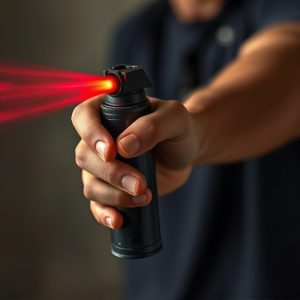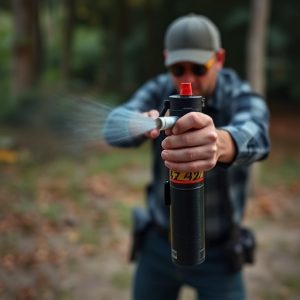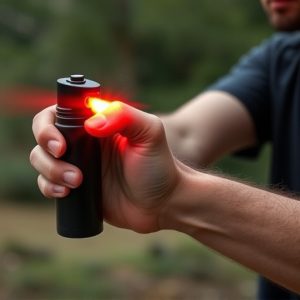Pepper Spray Safety: Protecting Pets and Legal Guidelines
Self-defense inflammatory spray (pepper spray) can cause severe adverse effects on pets, including e…….
Self-defense inflammatory spray (pepper spray) can cause severe adverse effects on pets, including eye irritation, respiratory distress, and panic. Remove spray residue immediately with water, and flush eyes thoroughly for 15 minutes. Seek immediate veterinary care for persistent symptoms. Use pet-specific formulations with lower capsaicin levels. Familiarize yourself with local laws regarding pepper spray ownership and usage to avoid legal issues.
“In today’s world, knowing how to protect yourself and your pets from potential threats is paramount. Self-defense inflammatory spray devices, like pepper spray, offer a powerful tool for personal safety, but their impact on animals cannot be overlooked. This article delves into the intricacies of these devices, guiding readers through understanding their mechanisms, the effects on pets, legal considerations, and responsible use. Learn how to choose the right pepper spray for pet safety and discover effective treatments if your pet is exposed.”
- Understanding Self-Defense Inflammatory Spray Devices
- How Pepper Spray Affects Pets and What to Do
- Choosing the Right Pepper Spray for Pet Safety
- Legal Considerations and Responsible Use of Pepper Spray Devices
Understanding Self-Defense Inflammatory Spray Devices
Self-defense inflammatory spray devices, often known as pepper spray, are non-lethal weapons designed for personal safety. These devices emit a fine aerosol mist containing capsaicin, the active ingredient found in chili peppers. When sprayed into the eyes and respiratory system of an assailant, it causes temporary blindness, coughing, and difficulty breathing, enabling the user to escape or seek help.
Understanding how these devices work is crucial when considering their use for self-defense, especially when treating pets exposed to pepper spray. Pets can accidentally come into contact with this spray during incidents, leading to discomfort or distress. It’s important to have a plan in place to manage and treat them afterward. This includes having on hand specific decontamination solutions recommended for neutralizing the effects of pepper spray on animals, ensuring their safety, and providing prompt care.
How Pepper Spray Affects Pets and What to Do
Pepper spray, while an effective self-defense tool for humans, can have severe and potentially harmful effects on pets if they are exposed to it. When pepper spray comes into contact with a pet’s eyes, nose, or mouth, it can cause irritation, inflammation, and even temporary blindness. Inhaling the spray can lead to difficulty breathing, coughing, and panic in animals. Their heightened senses make them more susceptible to the effects, as they may not understand or be able to escape the immediate area.
If your pet has been exposed to pepper spray, it’s crucial to act quickly. Remove any remaining spray from their fur or skin using a mild detergent or soap and plenty of water. If the eyes are affected, flush them thoroughly with clean water for at least 15 minutes. Seek veterinary care immediately, as they can provide specialized treatment to alleviate symptoms like respiratory distress or severe irritation. Treating pets exposed to pepper spray requires prompt action and professional assistance to ensure their safety and well-being.
Choosing the Right Pepper Spray for Pet Safety
When considering self-defense inflammatory spray devices, it’s crucial to prioritize pet safety. Choosing the right pepper spray for your pets involves understanding their unique needs and sensitivities. Unlike human formulations, pet-specific sprays are designed with lower concentrations of capsaicin to minimize irritation and potential health risks. Look for products marketed specifically for animal use, as these will often have a gentle formula that’s safe for eyes and skin without causing excessive panic or harm.
Treating pets exposed to pepper spray requires swift action. If your pet comes into contact with the spray, immediately rinse their face, eyes, and paws thoroughly with water. Seek fresh air and monitor your pet for any adverse reactions, such as coughing, difficulty breathing, or excessive drooling. Contact a veterinarian if symptoms persist or worsen, ensuring your pet receives prompt care tailored to their unique needs.
Legal Considerations and Responsible Use of Pepper Spray Devices
The legal landscape surrounding self-defense inflammatory spray devices, including pepper spray, varies significantly across jurisdictions. It’s crucial for individuals considering carrying such devices to understand the specific laws in their area to ensure compliance and responsible use. Many regions have strict regulations on the types of spray allowed, permitted uses, and restrictions on who can possess and carry them. Misuse or unauthorized possession can lead to severe legal consequences.
Responsible use involves understanding the device’s capabilities and limitations. Pepper spray is designed for self-defense in situations where an attacker is causing harm or about to do so. It’s not suitable for treating pets exposed to spray, as it can cause discomfort, respiratory issues, and even panic in animals. Users should be trained in its correct application and understand the range of effectiveness to avoid misusing it and ensure public safety.
Self-defense inflammatory spray devices, while powerful tools for personal safety, require careful consideration, especially when pets are involved. Understanding the effects of pepper spray on animals and choosing the right product is crucial. If your pet is exposed, prompt treatment is essential. Always adhere to legal guidelines and use these devices responsibly to ensure everyone’s safety. Remember, knowledge and preparation can go a long way in protecting both yourself and your beloved pets.


